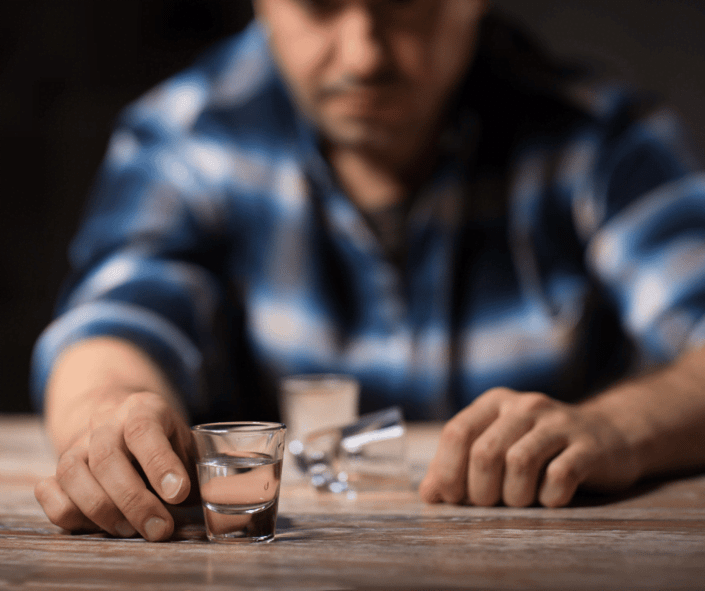Alcohol Withdrawal
What is alcohol abuse?
The contemporary understanding of alcohol misuse has expanded from a once narrow definition to a larger categorization of various unhealthy drinking behaviours. This spectrum covers a range of activities, from binge drinking – the practice of consuming substantial amounts of alcohol in a short time frame, often leading to acute intoxication – to more chronic forms like alcohol addiction and dependence in non-clinical settings.
Alcohol addiction refers to a pattern where individuals continue to consume alcohol despite experiencing adverse consequences, often driven by an uncontrollable craving for alcohol. This is distinct from, yet sometimes intertwined with, alcohol dependence. Alcohol dependence is characterised by the body’s physical or psychological need for alcohol. It is the result of prolonged, heavy alcohol use, leading to the body’s adjustment to functioning with a certain level of alcohol. This adaptation becomes so ingrained that the absence of alcohol triggers withdrawal symptoms, which can vary in intensity.
These withdrawal symptoms are key indicators of dependence and can include a range of physiological and psychological effects, from mild anxiety and restlessness to severe complications like seizures. The severity of these symptoms is often a reflection of the extent and duration of alcohol use.
Alcohol withdrawal timeline
The timeline of alcohol withdrawal typically unfolds as follows:
1. 6-12 hours after the last drink:
– Initial symptoms begin, which can include anxiety, headaches, shaking, nausea, and irritability.
2. 12-24 hours after the last drink:
– Symptoms may progress to more severe issues like hand tremors, disorientation, and seizures in some cases.
3. 24-48 hours after the last drink:
– This period may see the continuation of earlier symptoms, with the possible addition of increased heart rate, high blood pressure, and hyperthermia.
4. 48-72 hours after the last drink:
– The risk for the most severe form of withdrawal, delirium tremens (DTs), peaks during this period. DTs can include hallucinations, severe confusion, fever, and seizures.
5. 72+ hours after the last drink:
– Symptoms typically begin to lessen after 72 hours. However, some individuals may experience prolonged withdrawal symptoms, known as Post-Acute Withdrawal Syndrome (PAWS), which can last for weeks, months, or even longer. PAWS includes ongoing mood swings, sleep disturbances, and reduced energy levels.
What exactly is alcohol withdrawal?
Alcohol withdrawal syndrome (AWS) represents a physiological process that the body undergoes when it is suddenly deprived of alcohol after a period of sustained consumption. This condition can be triggered either by an individual’s decision to abstain from alcohol or by circumstances that prevent access to alcohol. The body’s adaptation to regular alcohol exposure means that abrupt cessation can precipitate a range of withdrawal symptoms, varying in intensity from mild discomfort to severe, life-threatening conditions.
The physical alterations induced by long-term alcohol consumption significantly impair the body’s ability to regulate alcohol intake, creating a challenging barrier to reducing or discontinuing use. This leads to a state of dependency, where the body and brain function under the influence of alcohol, and its absence triggers withdrawal.
An in-depth exploration of alcohol withdrawal reveals a spectrum of symptoms that can manifest in different stages following the last alcohol intake. Initially, individuals might experience symptoms like anxiety, headaches, nausea, and insomnia. As withdrawal progresses, these symptoms can intensify, leading to more severe manifestations such as tremors, heightened agitation, and in some cases, hallucinations.
One of the most severe forms of alcohol withdrawal is delirium tremens (DTs), which can occur in a small percentage of individuals undergoing withdrawal. DTs are characterised by profound confusion, vivid hallucinations, and severe tremors, often accompanied by seizures. This condition is considered a medical emergency due to its potential to cause life-threatening complications.
The management of alcohol withdrawal is critical and typically involves medical supervision. Treatment strategies often include the use of medications such as benzodiazepines, which help to reduce the severity of withdrawal symptoms and prevent complications like seizures. In addition to medication, supportive care – including hydration, nutrition, and monitoring of vital signs – is essential in managing withdrawal safely.
Psychological support plays a pivotal role in addressing the mental and emotional challenges associated with withdrawal. Counselling and therapy can provide individuals with coping strategies and emotional support, aiding in the recovery process and helping to prevent relapse.
Here are some alcohol withdrawal symptoms:
For further questions, such as how long do alcohol withdrawal symptoms last – see the FAQ section below.
Alcohol Craving

Alcohol craving is a powerful and often uncontrollable urge that typically occurs in individuals with a history of alcohol abuse, particularly in those identified as alcoholics. This craving is deeply rooted in the physiological effects of alcohol on the brain and body. Interestingly, the craving for alcohol is most intense when the substance is present in the body. This can be explained by understanding how alcohol interacts with the brain’s reward system, releasing dopamine and creating a sense of pleasure or euphoria.
When an alcoholic consumes even a small amount of alcohol, it triggers neurochemical reactions that amplify the craving. This reaction is so strong that after the initial drink, the individual often finds it difficult, if not impossible, to control further consumption. The craving is not just a desire but a compelling need, driven by both physical and psychological dependencies. The body, having recognized the presence of alcohol, demands more, and this demand can become overwhelming.
The initial decision to consume a drink sets off a powerful cycle of craving that is hard to break. This is why many alcohol recovery programs and support groups emphasise complete abstinence. The presence of alcohol in the system doesn’t just trigger a physical reaction; it also reactivates learned behaviours and drinking patterns, making the cycle of addiction hard to interrupt.
Obsession with Alcohol
Obsession with alcohol, in contrast to craving, occurs predominantly when the substance is not present in the system, particularly following detoxification or during periods of sobriety. This obsession is largely psychological and is characterised by a persistent preoccupation with alcohol. Unlike craving, which is a physiological response to the presence of alcohol, obsession is a mental phenomenon that can persist even in its absence.
This obsession is often described as a mental battle, where thoughts of consuming alcohol are incessant and overwhelming. It’s not just a passing thought but a constant fixation, where the mind continually circles back to the idea of drinking. This obsession can be so intense that it dominates an individual’s thinking, leaving little room for other thoughts or activities.
Furthermore, this obsessive state can be deceitful. It often convinces the individual that they can control their drinking, leading to a false sense of confidence. Thoughts like “one drink won’t hurt” or “I can stop after one” are common. However, this is a dangerous misconception for an alcoholic, as the initial act of drinking triggers the intense craving cycle, making it nearly impossible to stop at one drink.
Personal coping strategies are vital here. These can include engaging in physical activity, practising relaxation techniques such as deep breathing or meditation, and seeking support from friends, family, or professional counsellors.
Delirium tremens
In instances where an individual has a prolonged history of alcohol abuse or underlying health issues, the detoxification process can escalate beyond standard withdrawal symptoms, triggering a severe condition known as delirium tremens (DTs). This condition is characterised by a range of acute symptoms such as vivid hallucinations, extreme tremors, seizures, and abnormally high blood pressure. The presence of these symptoms indicates a critical need for constant and comprehensive medical supervision.
Delirium tremens represents a critical stage in the detoxification process, signalling a heightened level of danger. These symptoms not only pose immediate physical risks but also indicate significant neurological changes due to alcohol dependency. The duration of these severe symptoms can extend up to a week or more, maintaining a state of medical emergency throughout this period.
The health implications of DTs are far-reaching. Individuals suffering from this condition are at a heightened risk of experiencing serious cardiovascular events like heart attacks, and cerebrovascular accidents such as strokes. Additionally, the physical strain and psychological stress associated with DTs can exacerbate other underlying health conditions, complicating the recovery process.
Detox
What is alcohol detoxification and what are the benefits?
During alcohol detox, the body undergoes a natural cleansing process to rid itself of alcohol and readjust to functioning without it. This process typically involves medical supervision to ensure safety and comfort, especially for individuals with severe alcohol dependence.
After the initial hurdles of detoxification, the benefits of abstaining from alcohol become increasingly evident, not just physically, but mentally and emotionally as well.
Over time, the body continues to repair itself from the damages wrought by alcohol. Beyond the first month, further improvements in liver function can be observed. The liver, remarkably resilient, continues to heal and function more effectively, enhancing overall health. Additionally, other physical benefits become more pronounced. These include a more robust immune system, improved digestion, and a reduction in the risk of alcohol-related diseases.
The psychological benefits of sustained sobriety are equally significant. Post-detox, many individuals report a clearer mental state, improved memory, and better emotional regulation. The brain’s ability to recover and rebuild neural pathways that were impaired by alcohol use is a slow but steady process, leading to improved cognitive functions over time.
However, recovery is not just a physical process; it’s also a journey of emotional healing. Long-term abstinence from alcohol often brings about a deeper understanding of oneself, leading to improved self-esteem and better relationships with others. The absence of alcohol can lead to clearer thought processes, allowing individuals to address underlying issues that may have contributed to their alcohol use.
Lifestyle changes also play a crucial role in this recovery journey. Engaging in regular exercise, adopting a balanced diet, and participating in stress-reduction activities like meditation or yoga can significantly support the body’s healing process. These healthy habits not only improve physical health but also contribute to mental and emotional well-being.
The support of a strong community, whether it’s through therapy groups, family, or friends, is invaluable in maintaining sobriety. This support network provides encouragement, understanding, and accountability, which are essential components for successful long-term recovery.

Why Choose Us?
How do I begin the detoxification process?
Embarking on alcohol detoxification involves understanding and preparing for a variety of withdrawal symptoms, which vary depending on the individual’s level of alcohol dependency and overall health. Seeking advice from a healthcare professional before starting detox is crucial, as it provides essential medical guidance and support, ensuring a safer and more effective detoxification process. This step is vital in the recovery journey.
For individuals with a milder alcohol dependency, such as those engaging in ‘Dry January’, home detoxification can be a suitable option, especially under medical supervision. In these cases, detoxing at home can effectively help reduce or cease alcohol consumption.
However, for those with severe alcohol addiction, the risks associated with home detoxification are significantly higher. These individuals may face intense and potentially life-threatening withdrawal symptoms. For them, detoxification in a specialised facility, such as InnerLife Recovery, is recommended. Located in the serene and exotic environment of Marbella in Spain, InnerLife Recovery offers a unique setting that contributes positively to the recovery process.
The tranquil and picturesque landscape of Marbella provides a calming backdrop, essential for mental and emotional healing. The natural beauty and warm climate of the region can have a therapeutic effect, promoting relaxation and reducing stress, which are key components in the recovery process. Being in a new and different environment can also help individuals break free from old routines and triggers associated with their alcohol use, facilitating a fresh start.
InnerLife Recovery combines this serene setting with professional medical supervision and attentive care. This ensures a safe detox process for individuals with long-term alcohol dependence, managing complex withdrawal symptoms and preparing them for further treatment. The centre offers a holistic approach, with medication management for physical symptoms, and therapy and counselling for psychological support.



